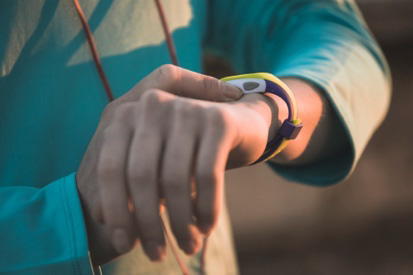Professor Juan Antonio Montiel coordinates the EU-funded H2TRAIN project.
The project "Enabling digital technologies for holistic health, lifestyle, motivation and monitoring support, supported by artificial intelligence networks (Enabling digital technologies for Holistic Health-lifestyle motivational and assisTed supeRvision supported by Artificial Intelligence Networks - H2TRAIN)" is funded by the sixth edition of the Electronic Components and Systems (ECS) Strategic Research and Innovation Agenda (ECS-SRIA) and the main challenges for enabling digital technologies in a holistic health lifestyle supported by artificial intelligence (AI) networks. It is the largest project funded under the umbrella of the European Chips Act. H2TRAIN is an innovation action for healthcare and smart sports coaching.
H2TRAIN is an industrial innovation action within the European Horizon Framework Programme (HORIZON EUROPE), classified as a Chips-JU innovation action outside its own initiative and programmes, i.e. it is a proposal made by European industry, outside the programmes and line, and of high added value.
The consortium consists of 35 partners, 34 beneficiaries and one associated partner, from seven countries: Austria, Germany, Spain, Finland, France, Italy and Poland. There are projects in technology, life sciences, social sciences and humanities, and intellectual property. Most of the partners are SMEs and large enterprises (LE), although major research institutions in the fields (hospitals, sports universities, technical universities) are also part of the group. The SMEs and LEs cover a wide range of expertise in the Electronic Components and Systems electronics sector, from application to cross-cutting and core technologies. H2TRAIN is a multidisciplinary cluster whose companies come from different technological fields (semiconductor developers and integrators of integrators, AI and IoT software developers AI and IoT) and from different fields life sciences, social sciences and humanities, IP and outreach experts, and public institutions. The University Institute of Applied Microelectronics (IUMA) of the University of Las Palmas de Gran Canaria is the project coordinator. The total funding of the project is 24 million Euros.
Research and innovation in H2TRAIN addresses digital enabling technologies in holistic lifestyle and health supported by artificial intelligence (AI) networks. H2TRAIN focuses on the main challenges and priorities of the European industry's Strategic Agenda for Electronic Components and Systems: health and wellbeing and digital society. In H2TRAIN, a range of advanced wearable devices and biosensors are integrated into textiles to record physiological signals, including biomarkers. The physiological signals are pre-processed by AI at the edge and by digital twins in the cloud, while health or sport experts monitor the evolution of individuals.

The project's areas of action include the Internet of Things (IoT), artificial intelligence (AI), edge computing, integrated intelligence, devices More Than Moore, heterogeneous integration, biodetection devices and energy harvesting, among others. Bio-sensors for e-health and smart monitoring of sport and fitness represent a class of devices that is dominating the consumer and professional market with unprecedented growth.
H2TRAIN will serve to define the next European programmes and strategies linking semiconductor technologies and their applications in relation to health, wellbeing and sport.
Many technologies are already available in the form of chips or algorithms. H2TRAIN aims to bring them to a higher level of maturity, building on the strength of the emerging European semiconductor industry. To this end, it aims to create a platform, an ecosystem also in the sense of clusters or projects - for example through the specific focus on health and wellbeing - to bring it to the table with other actors such as the mature semiconductor industry, health institutions, the sports industry and public and private entities related to the European proposals (Chips JU, HORIZON EUROPE), as well as other national and transnational initiatives such as the European initiative "Transforming Health and Care System (THCS)" and work together towards the same goal. To make Europe a leader in this field, and to regain some technological sovereignty.

H2TRAIN's vision is that stakeholders, as well as end-users, should be involved from the beginning and during the development process as live key performance indicators (KPIs) that monitor performance and deviations from the original intent and ensure that systems are affordable, useful and easy to use, and that our lives are better, and healthier.
H2TRAIN focuses on the main challenges and priorities of ECS-SRIA 2023 and 2024 in the application areas of health and well-being and digital society. The project aims to unlock the innovation potential of digital technologies in the smart healthcare market, focusing on the elderly, rehabilitation of chronically ill patients and recreational sport activities. H2TRAIN covers the entire value chain of electronic components and systems and systems of systems, from core and cross-cutting technologies to the application fields of remote assisted living for the elderly, patient rehabilitation monitoring and recreational sports training.
H2TRAIN poses a number of challenges for the future. In the area of human biomarker detection through sweat, the field of research and innovation is at an early stage. The integration of this device into textile garments is a growing field. Embedded intelligence at the edge is another current trend and challenge. A large part of AI/ML applications are running in the cloud. The creation of an edge-cloud continuum is a new scenario, which will become a trend generating new challenges in intelligent computing. There is a need and great demand, in the short term to reinforce learning in the area of embedded intelligence, but, in the long term, collaborative edge AI ecosystems are required.
H2TRAIN is supported by Chips Joint Undertaking (Chips-JU), through the Grant Agreement (GA) GA 101140052) and its members, including funding from: National Funding Agency for Austria, Innovation Funding Agency Business Finland, Bundesministerium für Bildung und Forschung, Ministry of Universities and Research in Italy, Ministry of Enterprises and Made in Italy, National Centre for Research and Innovation in Poland, Ministry of Digital Transformation and Public Administration in Spain, and Agencia Estatal de Investigación en España.